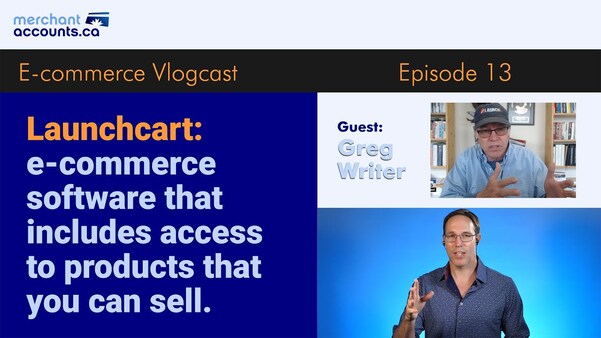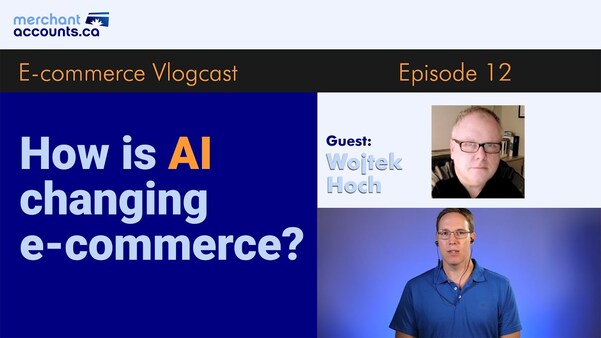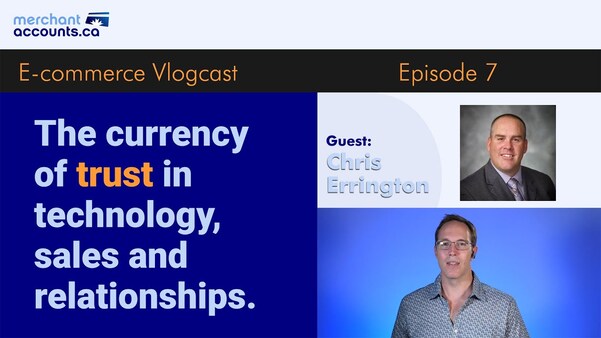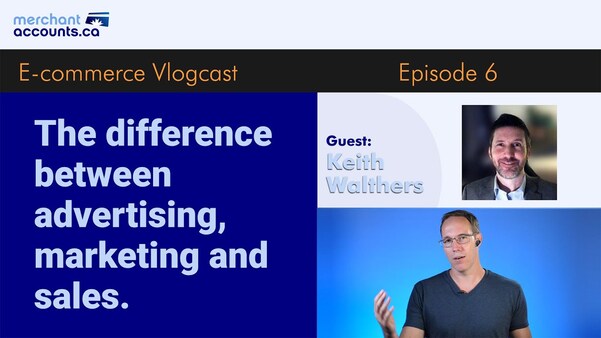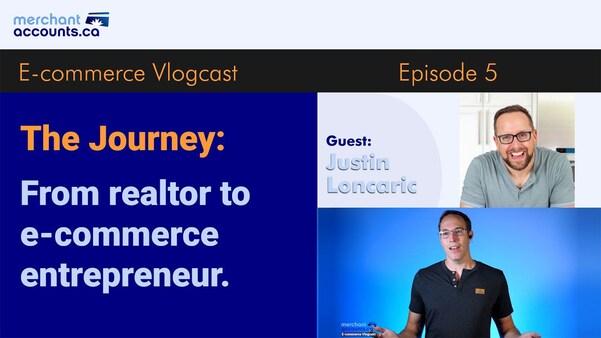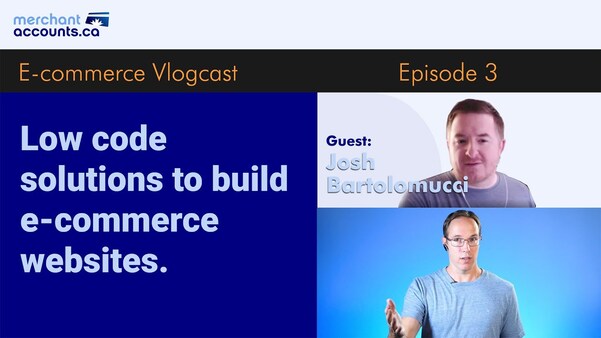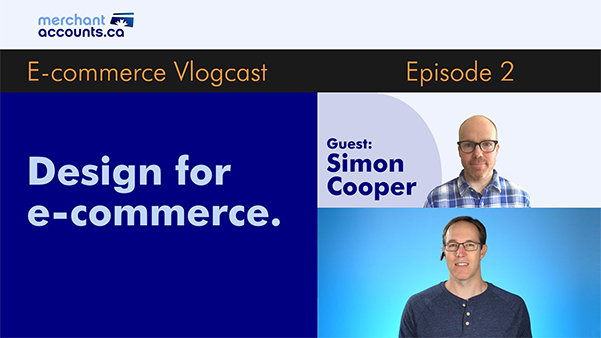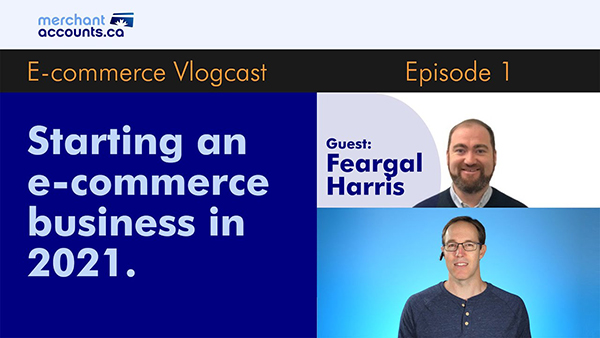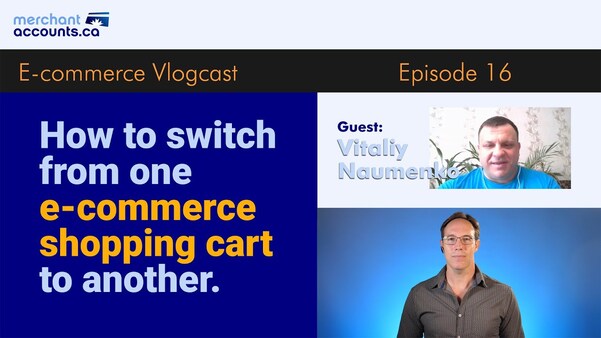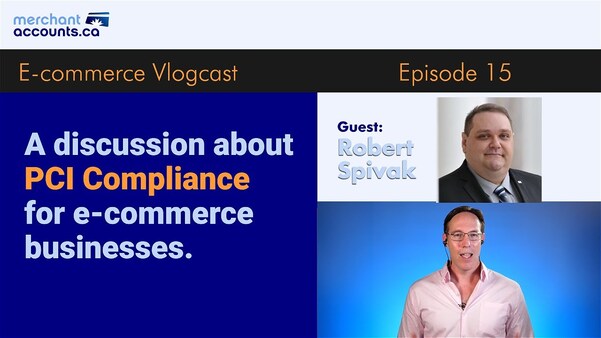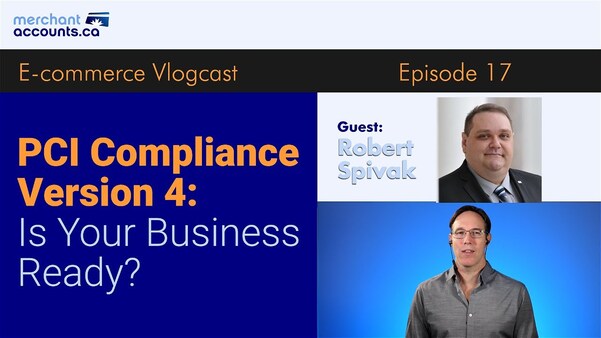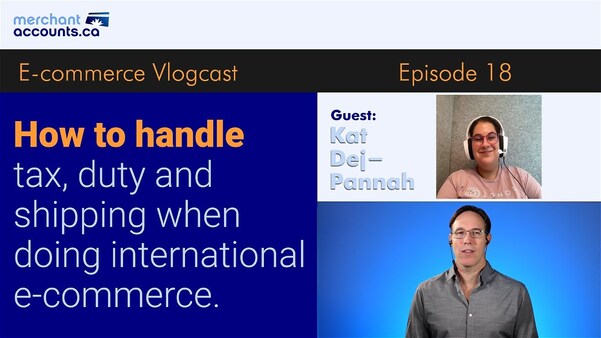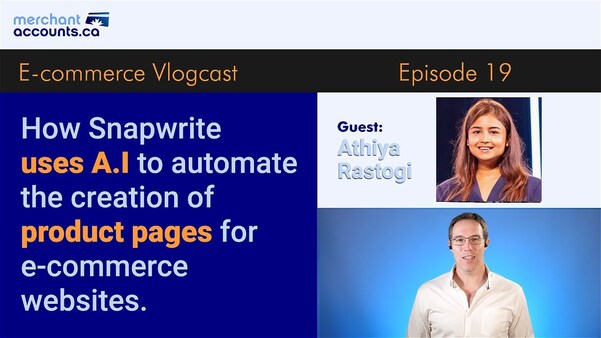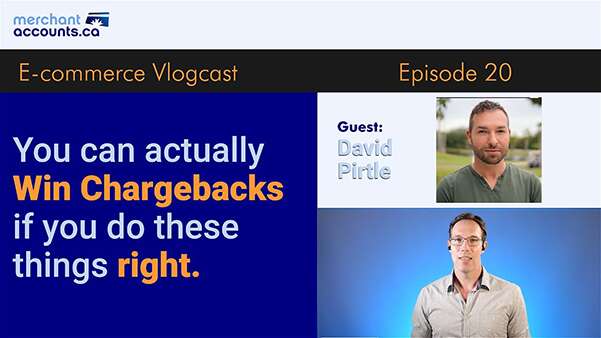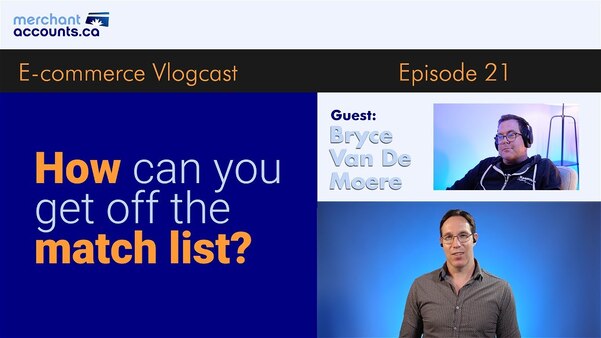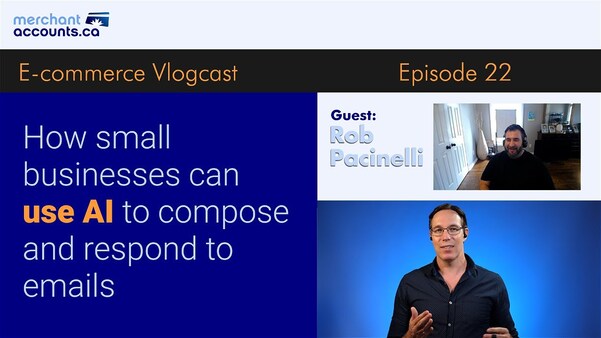April 20, 2023
by David Goodale
Building a Website: MODX, WordPress, and the importance of choose the right platform
(Slightly edited from video transcript for greater readability)
David Goodale:
Hello, David here at Merchant-Accounts.ca. Today I'm talking to Ryan Thrash, co-founder of Modx. Ryan has many years of expertise in open-source content management software, e-commerce, and basically helping businesses create effective websites. I'm going to pick Ryan's brain today, why it's so hard to build a website, and hopefully pick up some good tips on how to do it properly. Ryan, thanks for joining today.
Ryan Thrash:
Hey, David, thanks so much for having me. I'm super excited to talk today.
David Goodale:
Awesome. I'm just going to jump straight in here. It's 2023 and its still kind of hard to make a good website. Why is it hard for people to build a website?
Ryan Thrash:
I would actually argue that it's really easy to build websites. However, building a great website that'll really help a business grow and scale, being able to crush conversion in SEO, for instance, is a big challenge. There's really kind of different like there are different phases of business, businesses in general and, and a life cycle of a business. There are different phases of when you probably should invest in, building better, more robust websites.
David Goodale:
That makes sense.
Ryan Thrash:
For instance, if you're just starting out, you really just need a way for people to kind of find out what your product is, what your big idea is, being able to understand, and communicate with customers so that they can figure out, is this something that I want to do? That's, that's kind of when your pre-product market fit is kind of, a phrase that's tossed around a lot. That basically means, are people going to pay me, for my goods or services? Finding that product market is more important in shaping your product development. Of course, there are also other types of websites like blogs or information informational things that, don't really necessarily, center around kind of marketing, business, or things like that. Those are completely different areas, and those are, those are available on a lot of hosted services, like, a medium or, I'm trying to think of them, the latest one. Anyway, the medium is, is a good example of one of those. just, a plain old WordPress, spin-up of a free site on wordpress.com. There are a lot of other hosted services as well, whether it be, Jim Doe in Europe or, WordPress or Wick here in the States. Those are other options as well. Those allow you to have really fast wins, as does the theme ecosystem for WordPress.
David Goodale:
Interesting. I think what you're saying then is before you start, and I was going to get to this eventually anyways, picking the right platform for your type of business is very important. Then it's crucial.
Ryan Thrash:
On one hand, it's probably one of the most important things if your business relies on leads or selling things directly online. Covid kind of made that, a mandatory requirement for just about everybody, every organization, anyone, the first place that somebody is going to go is look up your website, see what it is. They're either going to use it as a launch point or, oh yeah, what's the phone number I need to call them? logging in and starting to work. Logging in is starting to work in your good, in your service, or in your, product that you're, doing or placing orders online, ordering things mm-hmm. um, the right platform at the right time is important. Again, going back to that product market fit idea, when you're figuring things out, figuring out the best version of whatever it is that you're going to be selling or, or offering to customers, it's not as important. When you start investing in really scaling and optimizing conversion, scaling and optimizing lead gen, investing in digital advertising either, either paid or organic. you start to run into, limitations on some of these platforms, and that's where things like speed and security really start to be primary drivers for the platform that you're going to Choose.
David Goodale:
Right. That type comes back, and I know that speed is one of the things that Google looks at a lot these days. Then, how do you get started? You have a logo and you have an idea, and I'm going to focus on e-commerce for this conversation. Like, what do you do? Like, how do you even go about getting started?
Ryan Thrash:
Is it as with everything in life? It depends. but I'm going to assume that you're a non-technical, non-web developer. There are a couple of venues. One, you go hire a web developer or a web designer to build something for you. You can go to a theme store or a Squarespace or a Wix and say, I want to just throw all this information up there really quick, start talking to customers, start interacting to figure out what's going to work. Those are all super viable ways, by a theme, and install it into a site. Then you, you can really quickly determine, you can really quickly determine what's going to work and how you want your site to look and work and behave. so that's how I would personally start. well, actually I would personally start very differently because I come from the background of building websites, and so it's a different story.
Ryan Thrash:
Once you've kind of achieved that product market fit, and that that'll oftentimes, at least here in the States, that'll probably come somewhere in between a quarter of a million to half a million dollars in revenue, upwards of a million to $2 million in revenue, depending on the type of industry that you're in. Once you kind of reach that aha moment of, I've kind of figured out what we're going to be a business, then it probably makes sense to optimize the foundation, the platform for what you're doing now. That might mean, investing heavily in, hiring somebody, to build out a very optimized website that performs and gives you the best opportunity to win an organic search, and the best opportunity to integrate with the tools that you need to integrate, to run your business.
David Goodale:
Now we're getting into the topic of custom versus platforms then, is that correct? unlimited resources, not many companies with that, but, you know, Berkshire Hathaway is building a new website. Do they use a platform or do they build it well, maybe that's a bad example. Cause it's not a product website, but Netflix, maybe that's a better example and they want to maximize those conversions. Are they going to use a platform or are they going to go custom?
Ryan Thrash:
You've got multiple tiers. your enterprise, your big enterprise customers will do a mix, a lot of times, and Netflix, for instance, is, is heavily, heavily, heavily data-driven. That's been one of their strong suits from day one. They're going to be pure custom applications across the boarding period. when you get into some of the larger enterprise customers, you're going to start looking at, they're typically going to deploy on a platform. The reason that they're doing a platform is those enterprise customers are, they may be a, a chain of restaurants, it might be a, an enterprise, software, analytics software. They'll typically wind-up choosing a platform. Then there's this big swath in the middle ground that I like to call the fortuneless 5 million. What that means is, is really pretty simple. It's not the small mom-and-pop shops, that are vital and awesome and a great place to start, but that's kind of the early product market fit stage or businesses that have not achieved, high transactional volume yet.
Ryan Thrash:
It's not focusing on that side; it's also not focusing on the global 5,000 or the Fortune 500 that you think of here in America. It's really those, those people that have figured out what their business is going to be, they know what they're going to do when they grow up, so to speak. It's this large swath of businesses that probably most people in America would never have heard of it. It's, your nut and bolt manufacturers in middle America that's selling 15 20 million, of building supplies and industrial fixtures and, and things of that nature. It's all these businesses that, that nobody has heard of. That's not nobody, but the bulk of majority of America will not have heard of them. Fantastic. Large growing businesses can hugely benefit from adopting a platform that takes care of a whole lot of the things that are important to get right. security speed, flexibility, integration points, all the things like that, that, that as you grow and get more sophisticated in your sales and marketing activities, you really do need to be able to plug into a whole lot of different tools. That's where a platform really can help, speed things Along because why reinvent the wheel?
David Goodale:
I know. That's a part of it. you know, I want to get to talking about MOD in a moment because I know you've built a platform to solve a lot of these problems. before I talk about Modx I want to talk about the platform that people are probably familiar, more familiar with, which are WordPress and WooCommerce too. That's I think, indisputably the most popular. What are the problems with it? in fairness, what are the benefits of it? This is meant for people that are kind of building their first or one of their first websites.
Ryan Thrash:
WordPress is an awesome platform, first and foremost, the end of the story. It actually powers approximately 45% of the entire, you know, public-facing websites on the internet today. Huge success story. Mm-hmm. They've built an incredible business. It's, it's a, it's a great tool. first, you know, if you are in that early stage of trying to figure out what you want to be when you grow up, it's a great tool because there are virtually limitless numbers and options for starting themes for website builders, for plugins, for different functionalities to different services. That's, that's really, really useful because it helps you get super quick, easy, fast wins, and that's awesome. Mm-hmm. The challenge that you run into with that though is it's also, one of the problems that can crop up depending on which of your plug-ins that you've selected, and there are hundreds of thousands I would suspect to choose from their search types out at about 900 or 9,999 options per category that you search in. You have a huge variety of choices to choose from. On the one hand, that's great. On the other hand, which of the 10,000 plugins that you're going to let me look at, do I choose what happens if one of them happens to contain a security vulnerability or a, an update breaks another one of the plugins that break yet another one of the plugins and all of a sudden now you have to figure out how to roll back and do developer things on your website?
David Goodale:
I hear WordPress people say, they kind of describe it as like a Frankenstein website in a way, at some point when you get too many different modules or plug-ins conflicting with each other.
Ryan Thrash:
The plugin is real. It is definitely, something that can be a blessing and a curse. Where we kind of difference in the way that we work is we, we, we tend to have a, very, configurable, set of plugins that can be used for a wide variety of surface, solutions. for instance, menu builders, and, and WordPress, there are at least 10,000, or excuse me, at least 9,999 of them because I've looked for those there. In Modx, there's a handful of menu builders, but that handful of menu builders in the Modx world can emulate and build all 9,999 variations of those menus. we very much are in favor of, configuration over convention, in our solution. We're also highly focused, on delivering very fast website speed and on really, locking down security.
Ryan Thrash:
Early on in our, history, of open-source software, we made a choice to adopt, a database technology, called PDO. That's just a big PHP convention and, our toolset. what PDO does is it really helps secure and lock down things. That turned out to be a very fortuitous, architectural decision early on because it really does make for a much safer, website, at the end of the day. In fact, when interesting, when Ruple adopted that same thing, I believe with Ruple seven or DPL eight, if you track the security vulnerabilities that are reported for the various major open-source software, WordPress obviously is in there, Ruple's, where in their Joomla is in there. If you track those, those security vulnerability reports, ours has been, very modest. We have an exceptional security track record, and then 10 plus years that Modx has been around, I think we're up to 41 reported vulnerabilities in the national institutes of standards and technologies .gov website. I think it's on the NIST website.
David Goodale:
For folks that don't know Ryan, because for most people they'll have no idea like there's no benchmark. How many would WordPress have in that timeframe?
Ryan Thrash:
They will get approximately 40 every other day. That's all ongoing today. They're, last time we updated the site with the tracks they were in the five or 6,000 range.
David Goodale:
Security is, supercritical too, and I spoke to you about this before, in a previous conversation. People don't, people take security seriously because they think of getting hacked, but what's getting damaged is you can patch your server, but how do you patch your credibility?
Ryan Thrash:
Yeah. One of the, of the worst things that could happen is a site break and it goes down and goes offline. That's really bad because nobody can then figure out how to contact you. That's bad from a reputational damage perspective. Probably what's even worse though is if somebody goes to your website and instead of selling, you know, instead of selling, t-shirts or whatever it is that you're selling or, or offering information about your service, all of a sudden, you've now been redirected to a site that's, transparently it's going to be selling pills or porn. That's hugely reputationally damaging.
David Goodale:
Oh, because they're hijacking it.
Ryan Thrash:
Yeah. A lot of, hacks exist. There's a handful of things that happens when hackers attack a website. One, they wanted to face it and put up their, banner of this site's been owned by somebody. Those are typically what are called script kitties. They're just out there running these programmatic kits of, attack vectors and just launching all of them against the website and seeing what sticks. Another one that's, been very prevalent is they'll compromise a website and install a crypto miner, that sends all the crypto that they happen to be able to mine to their wallet.
David Goodale:
They're using the CPU cycles on that server.
Ryan Thrash:
They're using the server CPU cycles too, to for-profit for fun and profit, right. A lot of them will use and set up phishing websites. They'll make a website that looks like, your bank login or a consumer service login, and they'll try to, use that to harvest usernames and passwords so that they can then go and take over, those deals. They'll soon spam, everybody gets tons of spam every single day. Um mm-hmm. Those are kind of your predominant ones or they'll redirect to, you know what, a lot of people will consider, less than savvy or less than savory, options for, web content in the world.
David Goodale:
Well, okay. Well, I definitely see the point of security, and let's talk a little bit. One of the things that you said that really interests me is the, well you didn't use this word, but in my mind, edits ability. when you have a, when you have a platform, like coming from my background, because 20 more, more years ago I was a developer. I'm not anymore, but I hated picking off-the-shelf stuff because I knew if the menu was on the right and I wanted to move it to the left, it'd be a hassle. How do you make something powerful without making it editable, without making it too complicated?
Ryan Thrash:
Yeah. There's been a big movement towards, website builders, if you will, kind of visual drag and drop website builders, um mm-hmm. That's a really, really great solution. The problem with a lot, a lot of them, however, is that they tend to create all this extra code and markup that really serves nothing serves nor no purpose. Let me back. It definitely serves a purpose. It's how it was architected is how they achieve the end goal of designing a website that looks and behaves like, the user that's building it wants it to look and behave. That's good. Mm-hmm. Where it can be a problem, however, is when it creates divs upon divs upon divs and nested bloated code, and all of a sudden that drags down the performance of your, of your website. That becomes a really big problem as you talked about earlier, websites, especially Google.
Ryan Thrash:
And as Google goes, so goes the entire rest of the search injury in injury, the search industry. That's just a reality of, of today. If you can make Google happy, you're going to typically do well with every othersearch index out there. speed is important. I think probably everybody's had an example or can recall, they've gone to a website, they're trying to wait for it to load a few seconds go by, it's still not loading and you just say, forget it, I'm going to go to the second result in the search, or the third result in the search. Right. A different website entirely. Those slow performances and the slow page loads really can have a very negative impact on visitor engagement and absolutely are now a key ranking signal in, how Google figures out who's going to be at the top of the list on the page.
David Goodale:
One. Absolutely. When you choose a platform that's one like a bloated website that inevitably impacts it. How have you made your platform so speedy?
Ryan Thrash:
It was a design, decision made that goes back to some early days when I was, infatuated with CSS, which stands for Casca Cascading Style Sheets. For people that don't know what that is, that's kind of, one of the ways that you can make things that are on the web look the way that you want them to look. You know, for a font, you say, I want it and this font in this size, in this color with this shadow, and it's just a styling guide that tells, you know, boxes and things how they should lay out on the page and whatnot. The important reason is that I was working on an e another open-source e-commerce project at the time, which was when dial-up modems were the predominant internet access. That's back going back into the nineties.
Ryan Thrash:
Back then, a 32K or 64K internet connection was really fast. The 128K ISDN line was really fast. Then you went up to the T1s if you had, a big budget, right? You were to spend a thousand dollars a month for a 1.04 megabit per second internet connection. That was blazing fast back then. What we started noticing is that getting into CSS and in, and in those days, every browser interpreted CSS differently and there were all these obscure hacks and it drove developers crazy because it was completely inconsistent and arbitrary. This is the Netscape days, right? Yes. Netscape, early Internet Explorer, early Mozilla, slash Firefox. Back in those days, even pre-Safari, it was a wild west of, weird, hacks that you would make in your CSS definitions to make it work across browsers and render consistently.
Ryan Thrash:
What we saw though is those pages that were styled with CSS were typical, kilobytes, many kilobytes' tens or hundreds of kilobytes smaller than a comparable, they were built with, you know, nested table layouts, don't need to get into it. They were just a much, they were 50 to hundred percent larger in size. what we saw in the e-commerce world specifically was that these smaller pages and this smaller markup really and truly led to more conversion. You would sell more if you had a faster website. That was really where I had my aha moment way back when was, why don't we make, and, and then, the technical phrase for that was semantic markup. You know, if, if it was an okay headline, you wrapped it in a headline tag. If it was a paragraph on the page, you wrapped it in a paragraph tab, not nesting it in all these nested table descriptions and TD's, or table data is what that was.
Ryan Thrash:
That semantic markup also coincidentally, early on, Google would use that semantic markup to know, aha, this is the H1 that's the most important headline on the page that helps me figure out what this page is about. It also at that time, used and adopted those methodologies that really helped in the search and organic search. Fortuitous, that we chose that. We always, from day one said, we don't want to prescribe the markup or the, the technologies that you use to build and present your website. we care about the data and we care about making it as easy as possible for a non-technical user to input that data, build out that website, and arrange and visually structure the website and, called information the architecture of how the layout of your pages, where your homepage is, what links off of that, all of those things.
Ryan Thrash:
We always were very, adamant about making it easy for somebody to be as absolutely light as possible if they wanted to with their web templates or as robust as they wanted to be. Early on made the choice that we were going to have no forced template system, we would give you if you had a field called content, we would have a little tag that you could insert and drop into your markup and it would replace that content tag with whatever the contents of that field were. so that's how we, tackled it and addressed it. In fact, the very first release of our software, the first public release when we said s is 1.0 software was back in 2005, and you could have built 2005 a website using HTML five, CSS three, and React, even though those technologies didn't exist at that time, we were completely output agnostic and, that's really neat.
Ryan Thrash:
Just like today, you can use it to power a web service if it's web service, if you want to output XML or j s o data. You can be very creative with what you can do in, in the Modx CMS platform. It's very, very fast about how it does it. If it's not purely dynamic data, it'll cash it out of the box on the first-page load and it's then just displaying functionally static text. Then you're talking about getting into the optimization of your web serving stack, not, not the page generator that you're using to generate pages.
David Goodale:
I can see obviously your level of technical expertise is very, sophisticated. Is Modx a good fit for someone who's not? Is it good for someone who's not technical?
Ryan Thrash:
Again, it gets back to where are you in the stage of your lifestyle? It is, it is a fantastic tool. If you know the basics of HTML CSS, it is a, better tool, I would argue that most for learning how to do some basic rudimentary, web development and web coding. If you're looking for the drag and drop plug and play website building experience, that's frankly where, where we don't shine as well today. But that's something that we're working on. We do have a really awesome, take on a drag-and-drop website builder. where it exceptionally shines is, for companies that have design libraries, for instance, and they say, these are how a blog page should look, or This is how a new product page would look, or This is how a new home, these are the types of elements that you could put on a, on a page for a new home in this development that we're putting together to have different blocks for different amenities and things like that.
Ryan Thrash:
With our, our front-end editor, which is called Fred, with our front-end editor, Fred, you can create these drag-and-drop blocks and then fill in the blank on the front end, save it, and you're now off to the races, with it. The long answer is there's not a huge existing theme ecosystem for quick fast wins today. something we certainly want to be addressed down the road, but we're, again, we've really kind of focused on that, on that post-product market fit, the environment where now we want to start building a custom website that fits our exact business, not well. Yeah. Not adapting your business to fit somebody's impression of how, how yours should work.
David Goodale:
You're describing someone who knows what their problems are. Maybe it's not good for version 1.0 of your website, but when you went to WordPress, you got frustrated, you're with Shopify, you got frustrated actually, and I want to talk about that for a second. I spoke to a Merchant just yesterday, a little story about this. When you pick a platform, my belief is you're picking a partner. Because I've worked with banks for 20 years, I'm absolutely allergic to bureaucracy. It drives me mentally top. Exactly. Trust me, I am too. In this merchant sold a really neat led decorative lamp and they were killing it. They were doing like 7 million a month in sales, so they got 0.7% chargebacks at some point, which is enough to get on a visa early warning program. They ended up, the long to short has Shopify canceled them and it's like they had 0.7% chargebacks. That's it, that's nothing, that's a blip. The problem is they can't get to anybody who cares. If you choose a platform, the beauty of it is the platforms dealing with the security, they're dealing with the uptime, they're dealing with the problems, but you have to deal with them when there's an issue. How does Modx approach openness, ownership of your data, that type of thing? Sure.
Ryan Thrash:
We still have our open-source content management system and, it powers millions of websites around the world. That means that there's a huge community of people out there that are excited about helping. We have a forum, and there's a Slack group. You've got that level, of help. There are just a lot of people in the open, open-source ecosystem that enjoy helping other people that have businesses to help other people. There's that. We have Modx professionals, a listing on our website of developers that are vetted to be Modx site builders around the world that you can get help from. when you get into, the actual hosting environment per se, our mod cloud environment is how we generate the bulk majority of our revenues. That is a very robust, very high performance, very security focused, shockingly, very, mm-hmm, it, we've really focused on speed, security, and collaboration workflow and in our hosting environment.
Ryan Thrash:
I think if you look at our website and you and you start doing some digging around on it, people love the support that we offer and provide. We do a really good job. We try to, we try to help people as much as we possibly can, and that even gets into implementation details. It goes far beyond just, making sure that there are no hacks, ma if there is a security incident that we're helping people work through that, because it is, is, and can be configured anyway, people can, can make an ac you know, can have an accidentally mixed configuration that says, oh, you've allowed arbitrary file uploads, that probably is not a good idea. somebody then figured out where those files were stored and, and, and, and called that and, and was able to gain, a level of privilege or access that they shouldn't have had access to. Mm-hmm. we help people solve those problems. We're really focused on the customer, and success with, Modx, both in the open-source community and in our hosting platform.
David Goodale:
Modx, I didn't even realize, that you could download Modx and install it on your own infrastructure.
Ryan Thrash:
A hundred percent happens hundreds of hundreds of times every day and thousands of times.
David Goodale:
If you're really conscious about ownership of your data, you've got your data and nobody can get it from you. Yes, absolutely.
Ryan Thrash:
Interesting, on the data ownership per side, because it's configured the way you want it to be configured, you can have that data go wherever you would like it to go, be encrypted in any manner that you'd like it to be encrypted, and you really are in control over that.
David Goodale:
Interesting. Is Modx a good choice for e-commerce merchants? Is e-commerce built into it or able to be built into it?
Ryan Thrash:
We have, I think we have a mutual friend in, in Foxy Cart, and Foxy Cartwas actually patterned after the way that Modx works. It's really one of those unique custom commerce applications out there that handle all the heavy lifting of things that you need to do to be successful in commerce, especially on the PCI compliance end without having to worry about, oh, now I've had to deal with security audits and, and, and compliance and all the things that you have to do to do that. It offloads that. Then, the neat thing about Foxy Cart, in that world is that they don't even care about a product catalog, which is the thing that you start with in virtually every single other e-commerce platform out there. Modx really cares about the product catalog. We care about displaying and building that catalog and letting people browse and shop and interact with that catalog as much as anybody in any way that they want to, to do a custom configurator. There's a, there's a boat manufacturer Malibu Boats that has a custom boat configurator.
David Goodale:
Those are wake boats, right?
Ryan Thrash:
Yeah. Wake boats, ski boats, you know, expensive holes in the weather that you keep throwing money at. But no, you can build all these really neat applications and then, and then use something like Foxy Cart to tie in. You can also obviously interesting throw on PayPal buttons, and you can throw in the Stripe integrations. Modx is a great integration platform. Yeah, we don't have a native, and, and there also is a native, e-commerce solution from a great mod developer called Mod Moore called Commerce. It's got a neat little workflow engine on the backend for what happens after you've made the sale, which is really and truly the, hardest part, of e-commerce shipping the products to your customers is, gets to be very challenging at scale.
David Goodale:
Right? All the business of being in business. Well, that's going to segue me to a question that I ask everyone. I'm just throwing you on the spot and you can just make up any answer you want here, but I always ask people, what secret advice do you have for e-commerce merchants like you? Your best secret weapon that you're willing to share.
Ryan Thrash:
The secret weapon is to make your site load as fast as possible and make sure it absolutely never gets hacked.
David Goodale:
Well, that makes absolute sense because ultimately that's going to, it's all about customers. It's so funny when I talk to people about e-commerce, it's all about the technology, but in reality, if you don't have customers, you don't have a business.
Ryan Thrash:
There. There's a really super neat study, that, Amazon did. They're, they're somewhat of a successful e-commerce company from my understanding.
David Goodale:
I thought that the book company.
Ryan Thrash:
Yeah, they sell books, I think, and everything else that you, you get at your house every other day. No, it, they, they tracked down, I think a 10th of a second translated into like it was some ridiculous number of a million dollars per hour or something just by cutting a 10th of a second off of a page load time. Now granted, most companies are not at Amazon's scale so let's not be ridiculous about that. If you give a customer a few extra seconds to really consider, are they going to make that spontaneous decision to get that dopamine hit? Not that it's manipulative, it's just the way that humans work. If you give people extra time to make that decision and, and go back on that decision, you're going to lose sales. It's just the way that, that the world works. If your page isn't loading fast enough, they're going to get frustrated and go away. It just is the way it works. It's, it's psychology and Conversion 101.
David Goodale:
It's so true. What, strikes me with that and, what has struck me a couple times in our conversation, Ryan everything has to work. Yeah. If the page loads at lightning speed and you have a crappy headline going back to that H1 tag, yeah. That's not going to work. If the images don't look good, you'll lose trust if, the copy doesn't flow. If your checkout funnel's not effective. Yes. You really are as strong as your weakest link Yeah. In that role.
Ryan Thrash:
That's where a combination like Modx and Foxy Cart really becomes a super interesting play because both of us, you know, both of our philosophies are letting people experiment and do things and change things to work exactly the way they want and need it to work. You can do experiments that won't necessarily be possible any other way. We had AC and affordably and quickly.
David Goodale:
I want to throw that in there.
Ryan Thrash:
Yeah. You know, In an example that is the exact combination there was, an eyewear company and, I don't know if at least in Texas, prescription eyeglasses are tax-free sunglasses that are not prescription or reading, reading glasses that are not prescription are taxed. If you're going to adopt something like Shopify at the time, at least, and I think it's still the truth, you cannot mix taxable and non-taxable items in the same, in the same, transaction. you can't have this set of lenses or this set of glasses right here frames if you put a prescription lens in it, the whole frames and lenses are not taxed. If you put standard sunglasses or, you know, blue blocker lenses in it, you're going to get taxed. You can't have that product, that one SKU, you know, which gets into inventory and product management and, and all of those things. You can't have that one SKU be both taxable and non-taxable in a traditional e-commerce platform and most e-commerce platforms.
David Goodale:
That's the painting in a corner that I was talking about earlier. Yeah. That, that makes, that makes a lot of sense. If people wanted to get a hold of you or Modx and learn more, how would they do that?
Ryan Thrash:
Modx.com. It's the best way to get in touch with us. There are contact forms there. you'll find links to the forums too, and support systems for everything that you need on that website. It's a great place to reach us.
David Goodale:
That's perfect. for any viewers that are watching this, I think what I'd say, if you know what your problem is and you've been frustrated in the past and you wish you had a solution for it, I think that's somewhere where something like Modx and something like Foxy Cart could come together and solve a problem for you.
Ryan Thrash:
Exactly. That's, that's where we're, that's where we really shine today is, is creating that customer experience for your customers that you may be thwarted when trying to do it any other way.
David Goodale:
Ryan, I just want to thank you so much for joining today.
Ryan Thrash:
Hey, appreciate it. It's been a lot of fun.
David Goodale:
Have a great day there.
Ryan Thrash:
You too.
Need professional guidance?
Contact us for a free one hour consultation.
Can I Help Lower Your Processing Fees?
If you found this content helpful, will you give me the opportunity to quote on your business?
View Rates


